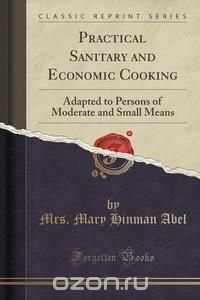Excerpt from Practical Sanitary and Economic Cooking: Adapted to Persons of Moderate and Small Means
The ration issued to the U. S. army is more abundant, more varied and of better quality than that issued to the army of any other nation. It should therefore keep the men in health and strength, and if it fails to do so and to be palatable to the healthy appetite, the fault is in its preparation.
A few suggestions as to the cooking of the soldier's ration are here offered.
The garrison ration is so abundant that it cannot be wholly consumed and according to the liberal system of exchange of food the surplus can be exchanged in such a way as to give still greater variety. In an organized camp this allows of excellent and varied cookery. But, the ration when on the march is much less varied and contains little or no fresh meat or soft bread. It requires therefore more skill on the part of the cook to render it palatable and nutritious.
When the ration consists of salt pork and hard tack and a choice between beans, peas, rice and hominy, with tea and coffee and a few condiments, how it is to be best prepared with limited time and with the simplest utensils, rests entirely with the cook.
On the march the breakfast must be substantial as there can be often no other regular meal until night. The camp fires or the portable ovens must do their work over night in order to effect this. Only in this way can baked beans or bean soup be added to the bacon and hard tack, and this addition is necessary if the meal is to afford proper nutrition for the day and if there is to be no other resource. Pea and bean meal will here find a place and are much preferable to whole beans.
If there is an issue of fresh beef, the trimmings of what has been used the day before may be simmered with such vegetables and flavors as are at hand and thickened with hard tack broken in pieces. Such a soup or stew will be relished if well flavored.
Corn meal mush cooked long and slowly becomes a well flavored and nutritious food instead of being raw and irritating as it is if cooked hastily. If cooked stiff it may be moulded in cakes while yet warm, floured and fried in fat. Hominy and oat meal may be treated in the same way.
Rice is an excellent breakfast dish and quickly cooked. It is relished with the addition of condensed milk or syrup.
A Bill of Fare For Seven Days on the March, or at the Front
is here suggested, in which, for reasons stated, only breakfasts and suppers are provided for. If dinners are possible, they can be arranged according to material and time at command. Coffee can for some days be changed for tea.
For bills of fare at camp or garrison or on board ship, some of those suggested from pages 151 to 175 of the Essay, will prove useful.
About the Publisher
Forgotten Books publishes hundreds of thousands of rare and classic books. Find more at www.forgottenbooks.com
This book is a reproduction of an important historical work. Forgotten Books uses state-of-the-art technology to digitally reconstruct the work, preserving the original format whilst repairing imperfections present in the aged copy. In rare cases, an imperfection in the original, such as a blemish or missing page, may be replicated in our edition. We do, however, repair the vast majority of imperfections successfully; any imperfections that remain are intentionally left to preserve the state of such historical works. Это и многое другое вы найдете в книге Practical Sanitary and Economic Cooking (Mrs. Mary Hinman Abel)
